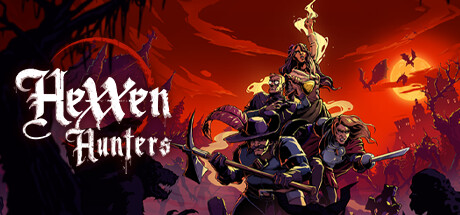Now, imagine the literal gates to hell have been opened, unleashing devils, witches, and dark fairy-tale creatures upon this world. This is the world of Hexxen 1733, a German TTRPG that serves as the setting for Hexxen: Hunters, which we announced at gamescom back in August.
[previewyoutube=N2JwtKc6C1o;full][/previewyoutube]
You play as a group of hunters tasked with defeating infernal forces such as were-creatures, witches, and monsters that plague the land. Our game immerses you in a conflict that has raged for a century since the gates to hell were opened by accident in the deepest parts of the Black Forest towards the end of the 30 Years War. Asmodeus – one of the foremost devils – has emerged from the gate and, with his minions, has conquered the surrounding lands, creating his own realm, and others have followed suit. Creatures of nightmares, folklore, and fairy tales (not the Disney kind, the original Grimm Brothers kind) have awakened and now roam the streets of every village and city in Europe and beyond.
Hunters are a diverse group of people who employ everything from muskets and magic to steel and science, standing against a dark tide. Evil comes in many guises and not only stalks the forests and swamps but walks in the bright light of lush gardens and fine houses in Baroque cities. The grim world of the Hexxen 1733 TTRPG (one of the most successful TTRPGs in Germany) is ripe with monster-hunting action, exploring dark enchanted forests, or thwarting the nefarious plans and intrigue of evil cults establishing their powers amongst the cities and palaces of the world.

The TTRPG – and also our take on the video game – is special amongst the current generation of similar games for its abstraction of combat: It does do away with counting squares and hexes, or worrying about flanking and zones of control, and goes for more cinematic and heroic combat, whilst keeping the tactical part challenging. Essentially, everything you do costs Actions; if you have enough left, you can do the thing. Shoot your musket, then attack another enemy 5 meters away with your sword, then drink a potion? Fine, let’s do it. No movement range limit, no half-turn for switching weapons, etc. Things become more about who you want to hit and crowd control as opposed to “Can I walk 30 feet to the next target and still attack?”.
We are trying to emulate that sense of “action RPG” with our game, doing away with the micro-management of single-step combat and 0.05% bonus steps and instead following the ‘rule of cool’: Your hunters will be able to pretty much roam around the battlefield and hit multiple enemies during their turn. This is a good thing because you will face literally HORDES of enemies. Combat in Hexxen: Hunters is asymmetrical – the dark forces are usually numerically superior; this will not be an even battle. In order to avoid being overwhelmed, it’s crucial which enemy you target and when, and how you manage to get them to be where you want them to be.

You want them to attack your tank and not your glass cannon, and you want to make sure you have the right combination of hunters to overcome that specific enemy. We will do a deep dive into combat in later installments, but combat in Hexxen: Hunters is a very dynamic affair, and the battlefield is constantly shifting and changing instead of two rows of about-equal parties hacking away at each other in fixed formations. All this is even more true when a boss battle happens – bosses have their own combat patterns and phases, and you will need to figure out the best way to overcome them by rethinking prior tactics and adapting on the fly.
Before you go on a mission, each hunter will have the opportunity to do a “Village Action” – preparing for the next battle, creating bombs or potions, upgrading their skills and feats or learning new ones. In a pinch, turn in some favors from the locals for ingredients or put on a magic show in the tavern to earn some gold. Of course, the village itself can be upgraded, turning the run-down tavern into an alchemical lab or the local blacksmith into a soul-light manufacturer if you manage to amass enough resources.

Once adequately prepared, your party ventures forth into an 18th-century alternate-history German Empire, partially overrun by infernal forces. Missions vary from fighting undead incursions from nearby cemeteries, exploring dark, enchanted woods ruled by witches, or confronting devil cults in splendid cities. You may even face devil cults directly, thwarting their schemes or seeking their support to achieve larger goals, such as stopping the ever-approaching Morningstar — an ominous foreshadowing of even darker times.
For each mission, you select your group of hunters – some of the missions allow you to explore the background and personal stories of each, delving into their history, motivations, and the events that led them to one of the most perilous occupations of the age.

The missions – while procedurally generated – have a storyline and certain events that form the seed for each, so there is a sense of purpose and progression to them. Many alternate missions can be picked, but they influence each other’s availability, and choosing one way may close another or open a third. Individual missions are usually between 15 and 30 minutes long, allowing you to play the game without spending hours getting into where exactly you left off. Of course, there is always the incentive to go for ‘just one more map’ to finally build that cathedral you have saved up for and enjoy the newly available actions and upgrades that come with that.
We will delve into each part of the game in subsequent blogs, and we look forward to your questions concerning the game!
May the wardens keep you,
Primetide
